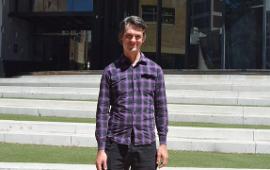PhD candidate Martin Bush wins Mike Smith Student Prize

In Summary
- Martin Bush won the Mike Smith Student Prize for his essay titled 'The Proctor—Parkes incident: Politics, Protestants and popular astronomy in Australia in 1880'
- His research focuses on the history and cultural meaning of science and astronomy
Swinburne PhD candidate Martin Bush has won the 2016 Mike Smith Student Prize for History of Australian Science or Australian Environmental History, awarded by the Australian Academy of Science.
The award requires entrants to write an essay on any aspect of the history of Australian science or Australian environmental history.
Mr Bush’s winning essay, titled ‘The Proctor—Parkes incident: Politics, Protestants and popular astronomy in Australia in 1880’ explores the conflict between popular astronomer Richard Proctor and politician Henry Parkes over an astronomy lecture held on a Sunday, which was an enormous controversy and talked about for many years.
"Since then, there has not been much study done on the issue," Mr Bush says.
“As a PhD student, that’s exactly what I like, something interesting, important, yet no one’s given it much attention.”
The essay will appear in the next issue of the Historical Records of Australian Science.
This year, the award was split between two students, the other recipient being Lilian Pearce from Australian National University.
“It’s very nice to have recognition of your work,” Mr Bush says.
Mr Bush’s interests lie in the history and cultural meaning of science, particularly astronomy.
“I’m looking at popular astronomy, not so much the practices of stargazing itself, but the cultural history of how astronomical ideas have been presented in society.
“Part of my thesis is tracing that issue of how it is that these cultural associations get made so strongly.”
Before his time at Swinburne, Mr Bush was a curator at Museums Victoria for 13 years. He is currently a research associate there.
“I love museums and cultural heritage organisations.
“I would also love to keep pursuing history. If I could find a way of having those two interests together, that would be great,” he says.

